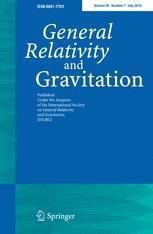GRG Editor's Choice: The propagation delay in the timing of a pulsar orbiting a supermassive black hole
 Hackmann, E. & Dhani, A., The propagation delay in the timing of a pulsar orbiting a supermassive black hole, Gen Relativ Gravit (2019) 51: 37. https://doi.org/10.1007/s10714-019-2517-2
Hackmann, E. & Dhani, A., The propagation delay in the timing of a pulsar orbiting a supermassive black hole, Gen Relativ Gravit (2019) 51: 37. https://doi.org/10.1007/s10714-019-2517-2
Editor's Choice (Research Article)
First Online: 04 March 2019
Abstract:
The observation of a pulsar closely orbiting the galactic center supermassive black hole would open the window for an accurate determination of the black hole parameters and for new tests of General Relativity. An important relativistic effect which has to be taken into account in the timing model is the propagation delay of the pulses in the gravitational field of the black hole. Due to the extreme mass ratio of the pulsar and the supermassive back hole we use the test particle limit to derive an exact analytical formula for the propagation delay in a Schwarzschild spacetime. We then compare this result to the propagation delays derived in the usually employed post-Newtonian approximation, in particular to the Shapiro delay up to the second post-Newtonian order. For edge-on orbits we also consider modifications of the Shapiro delay which take the lensing effects into account. Our results are then used to assess the accuracy of the different orders of the post-Newtonian approximation of the propagation delay. This comparison indicates that for (nearly) edge-on orbits the new exact delay formula should be used.
The authors:
Eva Hackmann is the head of the Gravitational Theory research group at the Center of Applied Space Technology and Microgravity (ZARM) at Bremen University. Her research is about General Relativity and alternative theories of gravity. She is interested in the motion of particles and fluids as well as the timing of clocks in strong gravitational fields, as e.g. close to black holes or neutron stars. She is also working on relativistic geodesy.
Arnab Dhani earned his MSc degree from IIT Roorkee and is now a graduate student in the Physics Department of Pennsylvania State University.
GRG Editor's Choice:
In each volume of GRG, a few papers are marked as “Editor’s Choice”. The primary criteria is original, high quality research that is of wide interest within the community.
